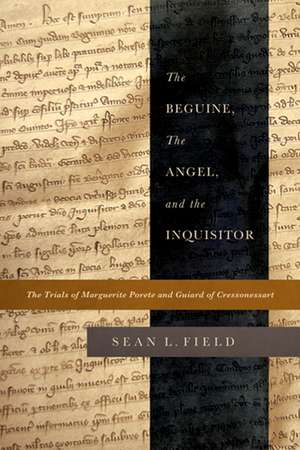The Beguine, the Angel, and the Inquisitor – The Trials of Marguerite Porete and Guiard of Cressonessart
Autor Sean L. Fielden Limba Engleză Paperback – 14 apr 2012
On 31 May 1310, at the Place de Grève in Paris, the Dominican inquisitor William of Paris read out a sentence that declared Marguerite “called Porete,” a beguine from Hainault, to be a relapsed heretic, released her to secular authority for punishment, and ordered that all copies of a book she had written be confiscated. William next consigned Guiard of Cressonessart, an apocalyptic activist in the tradition of Joachim of Fiore and a would-be defender of Marguerite, to perpetual imprisonment. Over several months, William of Paris conducted inquisitorial processes against them, complete with multiple consultations of experts in theology and canon law. Though Guiard recanted at the last moment and thus saved his life, Marguerite went to her execution the day after her sentencing.
The Beguine, the Angel, and the Inquisitor is an analysis of the inquisitorial trials, their political as well as ecclesiastical context, and their historical significance. Marguerite Porete was the first female Christian mystic burned at the stake after authoring a book, and the survival of her work makes her case absolutely unique. The Mirror of Simple Souls, rediscovered in the twentieth century and reconnected to Marguerite's name only a half-century ago, is now recognized as one of the most daring, vibrant, and original examples of the vernacular theology and beguine mysticism that emerged in late thirteenth-century Christian Europe.
Field provides a new and detailed reconstruction of hitherto neglected aspects of Marguerite’s life, particularly of her trial, as well as the first extended consideration of her inquisitor's maneuvers and motivations. Additionally, he gives the first complete English translation of all of the trial documents and relevant contemporary chronicles, as well as the first English translation of Arnau of Vilanova’s intriguing “Letter to Those Wearing the Leather Belt,” directed to Guiard's supporters and urging them to submit to ecclesiastical authority.
"Sean Field's new book is top-of-the-line historical scholarship, exquisitely written, and deeply satisfying on more than one level: for its research, for the quality of the documentation and argument, but also for its careful organization and smooth exposition, which transform a complicated story into a scholarly page-turner." —Walter P. Simons, Dartmouth College
| Toate formatele și edițiile | Preț | Express |
|---|---|---|
| Paperback (1) | 363.26 lei 6-8 săpt. | |
| MR – University of Notre Dame Press – 14 apr 2012 | 363.26 lei 6-8 săpt. | |
| Hardback (1) | 836.13 lei 6-8 săpt. | |
| Wiley – 29 sep 2022 | 836.13 lei 6-8 săpt. |
Preț: 363.26 lei
Nou
Puncte Express: 545
Preț estimativ în valută:
69.52€ • 72.31$ • 57.39£
69.52€ • 72.31$ • 57.39£
Carte tipărită la comandă
Livrare economică 14-28 aprilie
Preluare comenzi: 021 569.72.76
Specificații
ISBN-13: 9780268028923
ISBN-10: 0268028923
Pagini: 420
Dimensiuni: 151 x 227 x 28 mm
Greutate: 0.61 kg
Ediția:1
Editura: MR – University of Notre Dame Press
ISBN-10: 0268028923
Pagini: 420
Dimensiuni: 151 x 227 x 28 mm
Greutate: 0.61 kg
Ediția:1
Editura: MR – University of Notre Dame Press
Recenzii
"With The Beguine, the Angel, and the Inquisitor Sean Field has confirmed his place as one of the best scholars now working on French history in the High Middle Ages. His skill as a reader and translator of unpublished texts, the precision and good sense of his arguments, and the meticulous care with which he integrates the scattered insights gleaned from his predecessors' work, while also ferreting out and correcting their errors where necessary, make this one of the most important recent books in medieval studies. Field also has a gift for storytelling—and in Marguerite Porete and Guiard of Cressonessart he has two figures whose stories are worth telling. Even the most admired experts in the fields of medieval canon law, theology, gender, and heretical movements will find this book a sparkling revelation." —William Chester Jordan, Princeton University
"Sean Field has produced a fresh, urgently needed account of one of the most famous heresy trials of the Middle Ages. Returning to the original sources, he has given us vivid portraits not only of Marguerite Porete, but also of her prosecutor, her unlikely defender, the theologians who passed judgment for and against her book, and, not least, Philip IV, the king in whose meshes all of them were caught. More clearly than ever before, we can now see how Marguerite’s fate was bound up with those of Philip’s other victims, the Templars and the Jews. Both gripping and meticulous, Field’s narrative is full of small surprises and bold interpretations. His accessible translations of the trial documents and chronicle sources will be a great boon to medieval historians and their students." —Barbara Newman, Northwestern University
"Sean Field's new book is top-of-the-line historical scholarship, exquisitely written, and deeply satisfying on more than one level: for its research, for the quality of the documentation and argument, but also for its careful organization and smooth exposition, which transform a complicated story into a scholarly page-turner." —Walter P. Simons, Dartmouth College
“This is one of those histories that is a delight to delve into: detailed, excellent scholarship, and careful consideration to the nuances of the subject at hand. All the while Field maintains a readable narrative. . . . Students of medieval history, women’s history and women’s studies, mysticism and theology—those simply interested in the story behind Mirror of Simple Souls—will value Field’s meticulous work.” —Magistra
“This clearly written account of the trials of Marguerite Porete and her less-known supporter Guiard of Cressonessart both corrects misconceptions in the scholarly literature and offers a thick description of the intellectual, cultural, and political context in which these religious dissidents and the inquisitor William of Paris operated.” —Choice
"The academic page-turner is a rarity. . . . Sean Field has done readers a tremendous service by crafting a book that stands apart from the crowd for its clear, captivating writing style coupled by a satisfying depth of scholarship. . . . This exquisitely detailed, largely chronological history of the political, ecclesial, and social milieu surrounding the execution of Marguerite Porete is a welcome addition to any historian’s library." —H-France Reviews
“A close analysis of the trials of Marguerite and Guiard, which teases out the details of the lives of those involved, this book has much to recommend it not only to students of Marguerite and late medieval religion, but also to those interested in the machinations of the French court and the development of inquisitorial technique in the north.” —Sehepunkte
“Field argues that Marguerite’s prosecution rested on her actions rather than the content of her work, that Guiard’s actions were genuine yet misdirected against the ecclesiastic authorities, and that William and Philip IV were in a power game against the pope. Marguerite was ultimately caught in the political games of Guido and later of William and Philip IV.” —Catholic Books Review
“A gripping and nuanced tale emerges from these pages…. [This] is a study that can be recommended without reservation to the widest possible audience.” —American Historical Review
"The author of this study masterfully narrates the history of the imprisonment, trial, and condemnation of the Beguine, Marguerite Porete, and of her book (which are two separate processes, as he shows). Sean L. Field lays out both the book's fate at the hands of the late thirteenth- and early fourteenth-century religious authorities and Marguerite's persistent refusal to accept negative judgments against it, a refusal that ended with her being given over to secular authorities and put to death by fire at the Place de Grève in Paris on June 1, 1310. . . . By attending to everything from the nature of the document from which came much of the evidence for Marguerite's and Guiard's trials, to the writings of the Masters of Theology called in to judge excerpts from Marguerite's book, to the near simultaneity with which events effecting Marguerite, Guiard, and the Templars occurred, Field provides a handbook for the writing of history." —The Historian
“Sean Field has produced the most important, scholarly and detailed study of the case; in terms of the technical details, chronology and historical context his book is the final word on the subject. . . . this is a fabulous piece of technical scholarship, and is absolutely required reading for anyone who works on Porete. It is also a very powerful case study for understanding the political context in which a prosecution for heresy is carried out, of great importance therefore for those working on inquisition, heresy and the sharp end of orthodoxy.” —Journal of Ecclesiastical History
“This is a deeply researched and carefully written account of the heresy trails of Marguerite Porete and Guiard de Cressonessart by someone steeped in the sources and historiography of later Capetian France, Sean L. Field. . . . Field’s political approach will complement the many theological and literary studies of Marguerite, and will advance scholarship on administrative and ideological developments under Philip IV.” —English Historical Review
“One of the many achievements of this book is that it sets the historical record straight on the basic facts surrounding Marguerite Porete and her trial . . . . Field’s book has the added merit of being an engaging read. While accessible to non-specialists, it is a useful resource for scholars of medieval spirituality, lay religious women, canon law, inquisitorial process, and royal politics. Moreover, it has done much to nuance—and in some cases correct and clarify—widely held views on the life and death of an extraordinary woman.” —Medieval Feminist Forum
“With this volume, Sean Field has contributed a much-needed, common-sense exploration of the trials of Marguerite Porete and Guiard of Cressonessart to the scholarly literature of the Middle Ages. . . He has meticulously pieced together fragmentary and often ambiguous evidence into a fascinating reconstruction of a controversial episode. This is scholarly history at its best.” —The Catholic Historical Review
“A gripping and nuanced tale emerges from these pages…. [This] is a study that can be recommended without reservation to the widest possible audience.” —American Historical Review
"The author of this study masterfully narrates the history of the imprisonment, trial, and condemnation of the Beguine, Marguerite Porete, and of her book (which are two separate processes, as he shows). Sean L. Field lays out both the book's fate at the hands of the late thirteenth- and early fourteenth-century religious authorities and Marguerite's persistent refusal to accept negative judgments against it, a refusal that ended with her being given over to secular authorities and put to death by fire at the Place de Grève in Paris on June 1, 1310. . . . By attending to everything from the nature of the document from which came much of the evidence for Marguerite's and Guiard's trials, to the writings of the Masters of Theology called in to judge excerpts from Marguerite's book, to the near simultaneity with which events effecting Marguerite, Guiard, and the Templars occurred, Field provides a handbook for the writing of history." —The Historian
“Sean Field has produced the most important, scholarly and detailed study of the case; in terms of the technical details, chronology and historical context his book is the final word on the subject. . . . this is a fabulous piece of technical scholarship, and is absolutely required reading for anyone who works on Porete. It is also a very powerful case study for understanding the political context in which a prosecution for heresy is carried out, of great importance therefore for those working on inquisition, heresy and the sharp end of orthodoxy.” —Journal of Ecclesiastical History
“This is a deeply researched and carefully written account of the heresy trails of Marguerite Porete and Guiard de Cressonessart by someone steeped in the sources and historiography of later Capetian France, Sean L. Field. . . . Field’s political approach will complement the many theological and literary studies of Marguerite, and will advance scholarship on administrative and ideological developments under Philip IV.” —English Historical Review
“One of the many achievements of this book is that it sets the historical record straight on the basic facts surrounding Marguerite Porete and her trial . . . . Field’s book has the added merit of being an engaging read. While accessible to non-specialists, it is a useful resource for scholars of medieval spirituality, lay religious women, canon law, inquisitorial process, and royal politics. Moreover, it has done much to nuance—and in some cases correct and clarify—widely held views on the life and death of an extraordinary woman.” —Medieval Feminist Forum
“With this volume, Sean Field has contributed a much-needed, common-sense exploration of the trials of Marguerite Porete and Guiard of Cressonessart to the scholarly literature of the Middle Ages. . . He has meticulously pieced together fragmentary and often ambiguous evidence into a fascinating reconstruction of a controversial episode. This is scholarly history at its best.” —The Catholic Historical Review
Notă biografică
Sean L. Field is associate professor of history at the University of Vermont. He is the editor and translator of The Writings of Agnes of Harcourt: The Life of Isabelle of France and the Letter on Louis IX and Longchamp and author of Isabelle of France: Capetian Sanctity and Franciscan Identity in the Thirteenth Century, both published by the University of Notre Dame Press.









